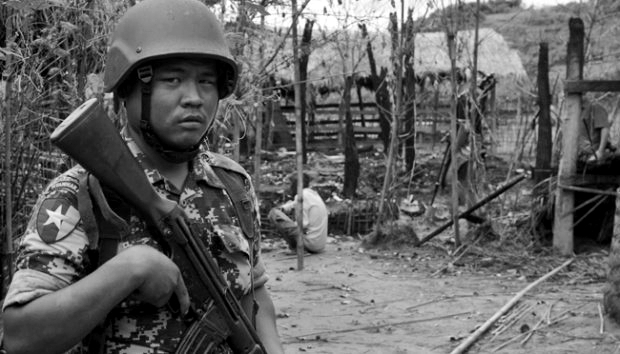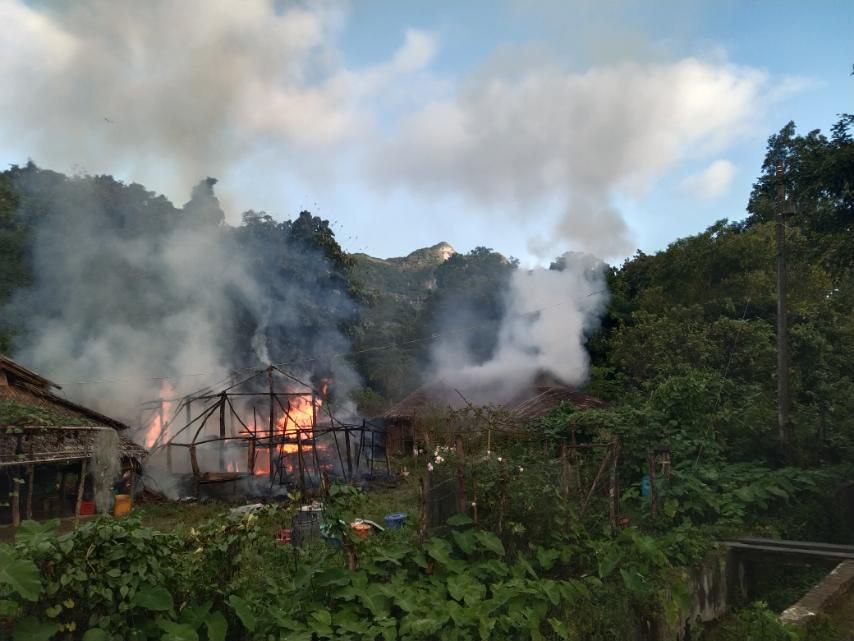
The Rohingya and Their Human Security
- 05/04/2015
- 0
By Aman Ullah
“Human security means that people can exercise [their] choices safely and freely – and that they can be relatively confident that the opportunities they have today are not totally lost tomorrow.” UNDP
Human security is a universal concern of human life and dignity. The consequences of human security issues such as famine, disease, and ethnic disputes do not stay within national borders. Rather, the international community is affected by them. According to the United Nations Development Programme (UNDP), “human security means that people can exercise [their] choices safely and freely – and that they can be relatively confident that the opportunities they have today are not totally lost tomorrow.” Human security has two primary aspects. First, it means safety from “chronic threats [such] as hunger, disease and repression.” Second, it constitutes “protection from sudden and hurtful disruptions in the patterns of daily life – whether in homes, in jobs or in communities.” The Rohingya are deprived of human security in both of these facets due to their lack of citizenship within Myanmar.
The concept of human security stresses the necessity for people to have the opportunity to meet essential needs and earn a living. It is an integrative concept rather than a defensive concept in the way that territorial security is defined. Security for people occurs only when all people are included in a country’s development. The Rohingya are not included in Myanmar’s development; rather, they receive no state protection because they are excluded from citizenship in the country. In fact, the right to citizenship, or a nationality is “widely recognized as a fundamental human right.” Thus, the exclusion of the Rohingya from citizenship within Myanmar is a violation of their human rights and renders them fundamentally insecure.
The human right not to be stateless is codified as an international norm in article 15 of the Universal Declaration of Human Rights, which states that ‘every person has the right to a nationality and that this nationality cannot be arbitrarily denied’. This right is also recognized in the 1961 Convention on the Reduction of Statelessness, which requires signatories to provide citizenship for persons who may otherwise be stateless.
This includes provisions for persons born within a state’s borders to be granted citizenship and for states to prevent situations whereby a person may lose his or her citizenship without gaining another. The human right to a nationality is important because citizenship is necessary to fully exercise civil, political, economic, and social rights within that state’s territory. Nationality also enables an individual to receive protection by their nation both domestically and internationally. Without citizenship, the Rohingya receive no protection within Myanmar or abroad.
The Myanmar government has removed all human security from the Rohingya population. Rather, the discrimination inflicted upon the Rohingya in Myanmar constitutes a state policy of ethnic cleansing against them. According to Anthony Oberschall, “ethnic cleansing is the use of force or intimidation for removing people of a certain ethnic or religious group from an area or territory that is their homeland. It used to be called ‘mass deportations.’”
Myanmar’s violation of Rohingya human rights are specifically targeted against the Rohingya ethnic group. Crimes that take place during ethnic cleansing include: . . . murder, torture, arbitrary arrest and detention, executions, rape and sexual assault, military and paramilitary attacks on civilians, robbery and extortion, destruction of cultural and religious buildings and monuments, destruction of homes, confinement of civilians in camps, purposeful starvation, and some others. . . . The purpose of these crimes is to get the target population to flee (kill and assault some, and the others will flee), to rob its property and make it destitute, to administer extra-legal punishment and revenge for alleged disloyalty or helping enemies, and to prevent return by having nothing to return for. Every one of these crimes exists in Myanmar’s persecution of the Rohingya. Local Rakhine leaders use the Rohingya as a convenient scapegoat for all of their society’s failings, and national politicians support discrimination against the Rohingya as a popular vote-getting scheme.
The stateless Rohingya receive no protection as a result of Myanmar’s 1982 Citizenship Law, and they are targeted with threats to their security under six of the seven main categories recognized by the UNDP: political, economic, food, health, personal, and community. (1994, HDR)
Political Security
The Rohingya suffer political insecurity through their exclusion from the political process and through the state’s policy of discrimination against them. Political security means the protection of basic human rights by the state and freedom from political repression. In stark contrast to this definition, the Rohingya are the target of human rights violations and have no civil or political rights under the Myanmar political system. The Rohingya have been excluded entirely from the formation of the Rakhine state government and the Myanmar central government.
Since the government excluded the Rohingya from Myanmar citizenship, they are given no political rights. As a result, they are frequently the subject of state repression. For example, the stateless Rohingya are regularly the victim of arbitrary detention in Myanmar. According to the UNDP, the police are common agents of state repression. State security forces in Myanmar habitually enforce checkpoints to restrict the movement of Rohingya within the country. They have a history of failing to protect the Rohingya from, and sometimes participating in, ethnic riots. Rather than receive protection from the state, the Rohingya are the target of institutionalized discrimination.
Economic Security
The Rohingya are marginalized economically in Myanmar due to their stateless status. Economic security requires “an assured basic income – usually from productive and remunerative work or in the last resort from some publicly financed safety net.”Employers are afraid of hiring undocumented people, so the Rohingya are unable to gain beneficial, long-term employment. Instead, they must rely on ‘daily work’ of poorly paid manual labor that does not last for long periods of time. The Rohingya have lived under movement restrictions for many years, and, since 2012, there has been an increase in government checkpoints, which further limit their ability to access essential services and to make a living. The Rohingya are regularly subject to extortion and arbitrary taxation of what meager money they acquire. They do not receive any economic support from the government, and they are unable to provide for the essentials of life. The pitfall of economic, or income, insecurity has serious repercussions on their ability to secure access to food.
Food Security
Food security requires that people have access to food, either by growing it, buying it, or acquiring it through a public food distribution system. Even when there is enough food available, people can still starve when they are unable to purchase or obtain food. Food security is a significant concern throughout Myanmar. Malnutrition is common with about 35 percent of infants, and continual inflation undercuts the ability of Myanmar’s poor to purchase basic foods, such as rice. For the marginalized Rohingya, the issue of food security is even worse. Without access to gainful employment, the Rohingya are unable to purchase food. They are subject to compulsory food donations, deliberate food shortages, and land confiscations by the state. Food security issues are worse for the Rohingya living in internally displaced persons (IDP) camps since the 2012 ethnic riots, which will be described in detail in part three of this chapter. Many Rohingya starve from lack of food.
Health Security
Rohingya have little to no health security. Health security means the prevention of death by poor nutrition and an unsafe environment, such as polluted water which contributes to diarrhea. Denial of access to health services aggravates the conditions.
According to the UNDP, developing countries spend little on health care and those at greatest risk for health security cannot afford doctors. In the case of Myanmar, health security for all citizens is abysmal. The government spends only 0.5 percent of gross domestic product (GDP) on health services. Medicines are largely unavailable except to the wealthy or well connected. Malaria (700,000 cases per year), tuberculosis (130,000 per year), and HIV/AIDS (estimated 350,000 cases in 2005) are common in Myanmar. As for the stateless Rohingya, their condition is even worse as they are denied access to what meager social service of health care exists in Myanmar.
Within the IDP camps, health aid does not exist and there are near daily reports of Rohingya deaths from preventable conditions. Many of these deaths occur when pregnant women face birth complications. Due to movement restrictions and their lack of citizenship, Rohingya cannot travel to see a doctor. The Myanmar government has exacerbated health issues in the IDP camps by restricting access by humanitarian aid groups, which primarily provide medical attention and food to the Rohingya. In addition to the lack of medical attention, Rohingya in the IDP camps do not have access to safe water or sufficient latrines. These conditions accelerate the spread of disease in the camps with the result that the Rohingya regularly die of diseases, which could otherwise be prevented.
Personal Security
One of the most conspicuous forms of discrimination against the Rohingya involves violations of their personal security. Personal security from physical violence is the most prominent aspect of human security, with threats from other groups of people in ethnic conflict as primary threats to personal security. UN institutions have carefully documented over two decades of human rights abuses against the Rohingya, which include systematic killings, rapes, and forced labor as a part of state policy.
Rohingya are routinely targeted with land confiscations and forced relocations. Local authorities have a history of refusing to protect the Rohingya against discrimination and violence in their communities. In 2001 and 2002, state security forces failed to intervene and sometimes participated in widespread mob attacks against Muslim communities across the country, which resulted in an unknown number of deaths and injuries. In some cases, local authorities increased tensions by encouraging the violence and intervening only at a late stage of the violence to end it.
Community Security
Rohingya communities are discriminated against as a whole in Myanmar without any state protection. Threats to community security endanger human security because “most people derive security from their membership in a group,” such as the Rohingya ethnic group, that provides cultural identity and a common set of values. The Muslim Rohingyas face threats against their community due to their Muslim religion and expressions of their faith, as well as their stateless status. The Rohingya are restricted from access to state-run secondary education, and the Myanmar government restricts Rohingya high school graduates from travelling outside Rakhine state to attend college or university. The Rohingya are required to obtain government permission to marry and are restricted in the number of children they can have legally. Myanmar government authorities restrict gatherings to celebrate Islamic holidays and do not permit repairs to mosques. Simply being a member of the Muslim Rohingya ethnic group invites persecution in Myanmar. Discrimination against the Rohingya cripples their community’s ability to provide security for its members.






